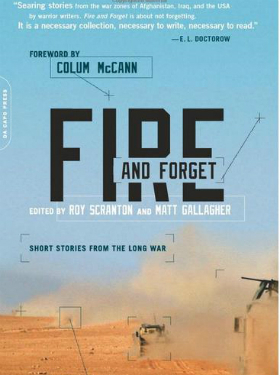'Fire and Forget': A review

Reviewed
by Brian Castner
Best
Defense book reviewer
A
version of this review first appeared in the August issue of Proceedings
of the U.S. Naval Institute.
If you believe the media coverage and
commentary, all of America is still waiting for the great fiction of the wars
in Iraq and Afghanistan. Many of last year's reviews of The Yellow Birds or Fobbit
or Billy Lynn's Long Halftime Walk
noted the supposed dearth of war novels to that point. In times past, America
waited 11 years for A Farewell to Arms,
16 for Catch-22, and 15 for The Things They Carried. Now our culture
wants to hear who won American Idol
by the end of the episode, and even Anthony Swofford, who knows something about
delayed gratification (his memoir, Jarhead,
was published 12 years after the first Gulf War), says on the back cover of Fire
and Forget, the new collection of short stories by military veteran
writers, "I've been waiting for this book for a decade."
Is the wait finally over? Yes, according to
Matt Gallagher, one of the collection's editors, who was impatient himself; he
wrote a piece for The Atlantic in
2011 asking when a great novel from the long wars would finally be written.
"Iraq and Afghanistan fiction is in a much
better place than it was when I wrote that article," he told me, before
hedging, "It's just beginning. There's no one dominant story, no one clean
narrative, to emerge from these postmodern, brushfire wars. There are many."
The form of Fire
and Forget follows its function, then: 15 tales with varied perspectives,
and while expected themes of struggle and disillusionment emerge, there is not
a carbon copy to be found here. If you are a fan of literary Paris Review or The New Yorker short stories -- casual tragedy, slow reveals,
ambiguous endings -- you will find familiar hardware in this collection, and
for good reason. These are serious writers, more than half graduates of
master's of fine arts programs, but unlike the traditional college student,
these veterans bring a life experience to the form that is substantial and
heart-breaking.
Perhaps fittingly, considering the
post-traumatic stress disorder newspaper headlines, there are more stories here
about the challenges of return than the horrors of war, more whiskey bottles
flying than bullets. In a number of stories about surreal post-war moments,
animals act as symbolic stand-ins for innocence, and thus are mercilessly shot,
squashed, and buried. For me, the stories of in-country combat were a
comparative relief from the grinding tales of heartache at home. At least we
know how the firefight will end; we have no such certainty about those still
laboring to reintegrate.
The winner for sheer visceral impact is Phil
Klay, whose story of returning is so spot-on I wonder if he wrote it while
still on the plane ride home. He gets everything pitch perfect, and not just
the major points, such as wanting to go back to war right away, literally hours
after landing. No, it was the small truths that returned me to my own
homecoming: the unfamiliar softness of a wife's embrace after months of hard
Humvees, the pleasant satisfaction of the first hangover. Klay remembers the
details so the rest of us don't have to.
David Abrams, the author of Fobbit, tells the brutal story of a unit
remembering fellow soldiers lost in combat, not with nostalgia but rather
obscenity-laced efficiency. "This short story is more typical of what I
normally write," Abrams told me. "It has more dramatic punch than . . . comedy veneer."
Siobhan Fallon's excellent story from the
perspective of an Army wife is a breath of fresh air, one that comes early in
the anthology and that honestly I could have used a little later. The veteran
experience can feel insulated and claustrophobic, and Fallon's incongruence
with the other pieces -- the only one not from the perspective of the solider
or veteran (although Gallagher's contribution is half and half) -- begs the
question, where is a piece about an Afghan family? An Iraqi interpreter? A new
refugee? Instead, the Iraqis and Afghans in Fire
and Forget are always "hajjis" or, in the words of contributor Ted Janis's
protagonist, "[expletive] traitors."
Why is this? "I think veterans are still stuck
in their own head," said Abrams. "And I think we Americans, to paint with a
very broad brush, lead very insular lives. We don't naturally think about
foreign policy. But for the purposes of this anthology, it's fine. Each of
these works of art stand on their own."
True, and they do so well, but even the story
from Andrew Slater, now a teacher of English at the American University in
Erbil in northern Iraq, is about a U.S. soldier struggling with traumatic brain
injury at home. Would he not have been the writer to bridge the gap? His story,
though, is so troubling and thought-provoking that I wouldn't trade it and
that's the point, isn't it? After 12 years of war, we're just starting to
understand what happened to our own soldiers. Perhaps in time we'll reach
across the gulf to those we were fighting -- with and against.
Brian
Castner is a former U.S. Air Force captain and explosive ordnance disposal
officer. He is the author of The
Long Walk: A Story of War and the Life That Follows (Doubleday, 2012). This review is reproduced here with the permission of its author.
Thomas E. Ricks's Blog
- Thomas E. Ricks's profile
- 436 followers



